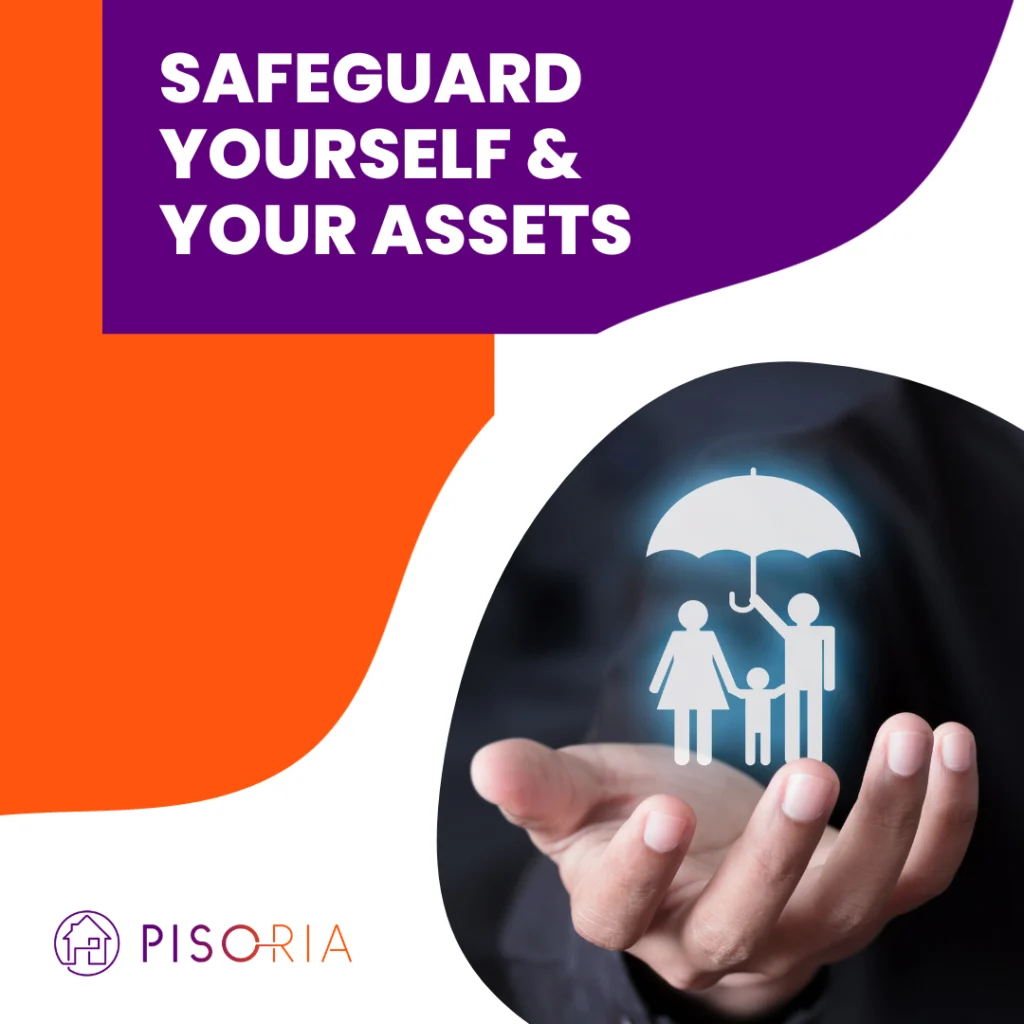The Importance of Investment Property Insurance

When you’ve invested your hard-earned money in real estate, ensuring that your property is protected should be a top priority. This is where investment property insurance comes into play. In this blog post, we’ll explore why investment property insurance is crucial for property owners and landlords.
Investment Property Insurance: A Safeguard for Your Assets
Investment property insurance, often referred to as landlord insurance, is a specialized insurance policy designed to protect property owners from an array of potential risks. Whether you own a single-family home, an apartment building, or a commercial property, this type of insurance is essential. Let’s delve deeper into why it’s so important.

1. Protecting Your Financial Investment
Your investment property represents a substantial financial commitment. It’s more than just bricks and mortar; it’s a valuable asset. Protecting this investment is not only logical but necessary. Investment property insurance serves as a safeguard by covering the costs of repairs or replacements in the event of damage caused by perils such as fires, storms, vandalism, or theft.
2. Safeguarding Against Natural Disasters and Accidents
Natural disasters can strike at any time, and their consequences can be devastating. From earthquakes and hurricanes to floods and wildfires, these events can cause extensive damage to your property. Investment property insurance provides a safety net, allowing you to rebuild or repair your property without depleting your personal resources.
3. Liability Coverage for Landlords
As a landlord, you could be held liable for accidents that occur on your property. If a tenant or visitor is injured due to a property-related issue, you could face legal and medical expenses. Investment property insurance typically includes liability coverage, which protects you from these unexpected costs.
4. Covering Rental Income Losses
Now, imagine your rental property becomes uninhabitable due to a covered event like a fire. Without rental income, you might struggle to cover mortgage payments, property maintenance, and other expenses. Investment property insurance can include loss of rental income coverage, which helps bridge the financial gap during periods when your property is unlivable.
Choosing the Right Investment Property Insurance
Selecting the right insurance for your investment property is a critical decision that should not be taken lightly. Several factors should influence your choice:
- Location and Risk Factors: Properties located in disaster-prone areas may require additional coverage. Consider the property’s location and associated risks when deciding on the level of coverage.
- Property Value and Replacement Cost: Ensure that your insurance coverage matches the property’s value and potential reconstruction costs. Undervaluing your property can lead to insufficient coverage.
- The Age and Condition of the Property: Older properties may require specific coverage. The property’s condition and maintenance practices can affect your insurance premiums.
- Tenant Screening and Management: Effective tenant screening can reduce potential risks, and your property management practices can impact your insurance decisions.
Additional Coverage Options
Investment property insurance offers various coverage options to meet your unique needs, including:
- Dwelling Coverage: This covers the physical structure of your property.
- Liability Insurance: Protects you from legal claims and associated medical expenses when you are found liable for accidents on your property.
- Loss of Rental Income Coverage: Provides income replacement during property repairs, ensuring you don’t face a financial crunch when your property is unoccupied due to damage.
- Personal Property Coverage: This extends protection to the personal property you may keep in the rental property, such as appliances or furnishings.
Before selecting a policy, it’s essential to understand these options and tailor your insurance to your property’s specific requirements.
Find the Right Insurance Provider
Choosing a reputable insurance provider is just as important as choosing the right coverage. Researching insurance companies, comparing quotes and coverage options, seeking recommendations, and reading reviews are all part of the process. Additionally, working with an experienced insurance agent can simplify the process and help you find the best policy for your investment property.
Saving Money on Investment Property Insurance
Insurance costs can add up, especially if you own multiple properties. To make the most of your investment, consider these strategies for saving money on investment property insurance:
1. Bundling Policies
If you have multiple investment properties, consider bundling them under a single insurance provider. Insurers often offer discounts for multiple policies.
2. Security and Safety Measures
Invest in security and safety measures for your properties. Installing security systems, smoke detectors, and fire extinguishers can not only reduce risks but also lower your insurance premiums.
3. Raising Deductibles
Increasing your deductibles can reduce your premiums. Just ensure that you’re comfortable with the out-of-pocket expenses in the event of a claim.
The Claims Process
Knowing how to file a claim is crucial. In case of property damage or loss, understanding the claims process can make it smoother and less stressful. Here are some steps to consider:
- Notify Your Insurance Provider: Contact your insurance provider as soon as you discover the damage. Most policies require timely reporting.
- Document the Damage: Take pictures and videos of the damage and keep all relevant documents, such as repair estimates and receipts.
- Obtain Necessary Repairs: Make necessary temporary repairs to prevent further damage. Your insurance may cover these costs.
- Stay in Contact: Keep communication lines open with your insurance company. They’ll guide you through the process.
- Follow Up: After the claim is filed, follow up as needed to ensure a prompt resolution.
Case Studies – Real-Life Scenarios
To illustrate the significance of investment property insurance, let’s look at some real-life scenarios where it played a crucial role:
Scenario 1: Natural Disaster Strikes
Imagine owning a coastal rental property that’s affected by a hurricane. The damage is extensive, and your property is temporarily uninhabitable. Without loss of rental income coverage, you’d face a substantial financial burden. However, with the right insurance, you receive compensation for the rental income lost during the repairs.
Scenario 2: Liability Claim
In another scenario, a tenant slips and falls in your rental property, sustaining injuries. The tenant files a lawsuit against you, claiming negligence. Your liability insurance comes to the rescue, covering the legal costs and medical expenses, protecting your finances and your reputation as a landlord.
Scenario 3: Fire Damage
A fire breaks out in your rental property, causing severe damage. Dwelling coverage kicks in, covering the costs of rebuilding or repairing the property. This prevents a significant financial setback and allows you to restore the property for future rentals.
Certainly, here’s an extended version of the blog post to reach a total word count of 2500 words:
Title: The Importance of Investment Property Insurance
SEO Keyword: Investment property insurance
Investing in real estate can be a rewarding venture, but it’s not without its risks. Protecting your assets is paramount, and that’s where investment property insurance comes into play. In this comprehensive blog post, we’ll explore the significance of investment property insurance, why it’s vital for property owners and landlords, and how to make informed decisions about your coverage.
Investment Property Insurance: A Safeguard for Your Assets
Investment property insurance, often referred to as landlord insurance, is a specialized insurance policy designed to protect property owners from an array of potential risks. Whether you own a single-family home, an apartment building, or a commercial property, this type of insurance is essential. Let’s delve deeper into why it’s so important.
1. Protecting Your Financial Investment
Your investment property represents a substantial financial commitment. It’s more than just bricks and mortar; it’s a valuable asset. Protecting this investment is not only logical but necessary. Investment property insurance serves as a safeguard by covering the costs of repairs or replacements in the event of damage caused by perils such as fires, storms, vandalism, or theft.
2. Safeguarding Against Natural Disasters and Accidents
Natural disasters can strike at any time, and their consequences can be devastating. From earthquakes and hurricanes to floods and wildfires, these events can cause extensive damage to your property. Investment property insurance provides a safety net, allowing you to rebuild or repair your property without depleting your personal resources.
3. Liability Coverage for Landlords
As a landlord, you could be held liable for accidents that occur on your property. If a tenant or visitor is injured due to a property-related issue, you could face legal and medical expenses. Investment property insurance typically includes liability coverage, which protects you from these unexpected costs.
4. Covering Rental Income Losses
Now, imagine your rental property becomes uninhabitable due to a covered event like a fire. Without rental income, you might struggle to cover mortgage payments, property maintenance, and other expenses. Investment property insurance can include loss of rental income coverage, which helps bridge the financial gap during periods when your property is unlivable.
Choosing the Right Investment Property Insurance
Selecting the right insurance for your investment property is a critical decision that should not be taken lightly. Several factors should influence your choice:
- Location and Risk Factors: Properties located in disaster-prone areas may require additional coverage. Consider the property’s location and associated risks when deciding on the level of coverage.
- Property Value and Replacement Cost: Ensure that your insurance coverage matches the property’s value and potential reconstruction costs. Undervaluing your property can lead to insufficient coverage.
- The Age and Condition of the Property: Older properties may require specific coverage. The property’s condition and maintenance practices can affect your insurance premiums.
- Tenant Screening and Management: Effective tenant screening can reduce potential risks, and your property management practices can impact your insurance decisions.
Additional Coverage Options
Investment property insurance offers various coverage options to meet your unique needs, including:
- Dwelling Coverage: This covers the physical structure of your property.
- Liability Insurance: Protects you from legal claims and associated medical expenses when you are found liable for accidents on your property.
- Loss of Rental Income Coverage: Provides income replacement during property repairs, ensuring you don’t face a financial crunch when your property is unoccupied due to damage.
- Personal Property Coverage: This extends protection to the personal property you may keep in the rental property, such as appliances or furnishings.
Before selecting a policy, it’s essential to understand these options and tailor your insurance to your property’s specific requirements.
Find the Right Insurance Provider
Choosing a reputable insurance provider is just as important as choosing the right coverage. Researching insurance companies, comparing quotes and coverage options, seeking recommendations, and reading reviews are all part of the process. Additionally, working with an experienced insurance agent can simplify the process and help you find the best policy for your investment property.
Saving Money on Investment Property Insurance
Insurance costs can add up, especially if you own multiple properties. To make the most of your investment, consider these strategies for saving money on investment property insurance:
1. Bundling Policies
If you have multiple investment properties, consider bundling them under a single insurance provider. Insurers often offer discounts for multiple policies.
2. Security and Safety Measures
Invest in security and safety measures for your properties. Installing security systems, smoke detectors, and fire extinguishers can not only reduce risks but also lower your insurance premiums.
3. Raising Deductibles
Increasing your deductibles can reduce your premiums. Just ensure that you’re comfortable with the out-of-pocket expenses in the event of a claim.
The Claims Process
Knowing how to file a claim is crucial. In case of property damage or loss, understanding the claims process can make it smoother and less stressful. Here are some steps to consider:
- Notify Your Insurance Provider: Contact your insurance provider as soon as you discover the damage. Most policies require timely reporting.
- Document the Damage: Take pictures and videos of the damage and keep all relevant documents, such as repair estimates and receipts.
- Obtain Necessary Repairs: Make necessary temporary repairs to prevent further damage. Your insurance may cover these costs.
- Stay in Contact: Keep communication lines open with your insurance company. They’ll guide you through the process.
- Follow Up: After the claim is filed, follow up as needed to ensure a prompt resolution.
Case Studies – Real-Life Scenarios
To illustrate the significance of investment property insurance, let’s look at some real-life scenarios where it played a crucial role:
Scenario 1: Natural Disaster Strikes
Imagine owning a coastal rental property that’s affected by a hurricane. The damage is extensive, and your property is temporarily uninhabitable. Without loss of rental income coverage, you’d face a substantial financial burden. However, with the right insurance, you receive compensation for the rental income lost during the repairs.
Scenario 2: Liability Claim
In another scenario, a tenant slips and falls in your rental property, sustaining injuries. The tenant files a lawsuit against you, claiming negligence. Your liability insurance comes to the rescue, covering the legal costs and medical expenses, protecting your finances and your reputation as a landlord.
Scenario 3: Fire Damage
A fire breaks out in your rental property, causing severe damage. Dwelling coverage kicks in, covering the costs of rebuilding or repairing the property. This prevents a significant financial setback and allows you to restore the property for future rentals.
Legal Aspects of Landlord Insurance
In addition to understanding the coverage options, it’s essential to be aware of the legal aspects of landlord insurance:
- Legal Requirements for Landlords and Insurance: Some states and municipalities may have specific insurance requirements for landlords. Ensure that you comply with these regulations.
- Tenant Rights and Responsibilities: Knowing your tenants’ rights and responsibilities can help you avoid potential legal disputes and ensure a smooth landlord-tenant relationship.
- Fair Housing Laws and Discrimination: Familiarize yourself with fair housing laws to prevent discrimination in your rental practices. Violating these laws can result in legal troubles.
- Eviction Policies: Have clear and legal eviction policies in place to protect both your interests and those of your tenants. Ensuring that your actions comply with local laws is essential.
In Conclusion
Investment property insurance is more than just a legal requirement; it’s a smart financial decision. It safeguards your property, your finances, and your peace of mind. By choosing the right coverage and provider, you can ensure that your investment property remains a profitable and secure venture.
In the world of real estate investments, it’s not just about acquiring properties; it’s about protecting them and ensuring their continued profitability. Invest in the protection of your real estate assets today with investment property insurance.
Additional Resources
For further information on investment property insurance, we recommend the following resources based on your city and borough. This is an example of Tower Hamlets. If you are a landlord who lives abroad you might find interesting this article.

